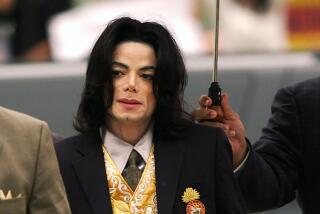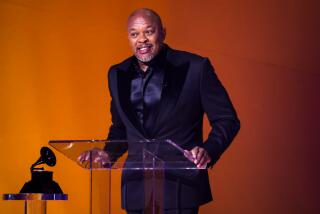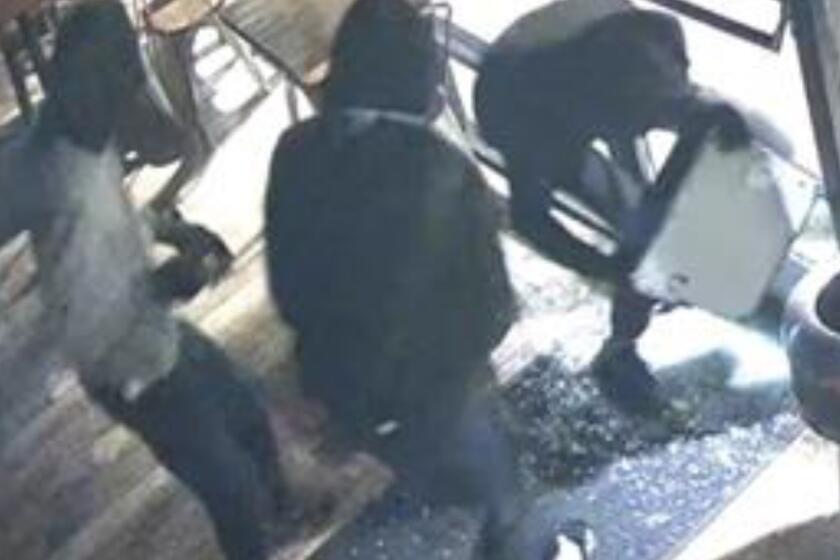Doctor says he told AEG exec that Michael Jackson was a drug addict
A doctor who traveled on Michael Jackson’s 1993 worldwide “Dangerous” tour testified that he gave the singer a shot of Demerol and a 24-hour intravenous morphine drip while they were in Thailand and that he told a ranking AEG executive that the singer was a drug addict.
Dr. Stuart Finklestein, who testified via a video deposition that was played for jurors Monday, said he was a long-time friend of Paul Gongaware, who was tour manager of the “Dangerous” concerts and is one of the defendants in the wrongful death suit brought by Jackson’s mother and three children.
The testimony came in the 43rd day of the wrongful-death trial, a case that seeks to put blame for Jackson’s death of entertainment titan and two music industry executives.
PHOTOS: Michael Jackson | 1958-2009
Finklestein is now an addiction specialist, but when he went on tour with Jackson his job was to minister to the crew. He said the first time he met Jackson was when he was called to his hotel room, where the singer appeared to be in pain. Finklestein said he was put on the phone with Allan Metzger, the singer’s doctor in Los Angeles. Metzger told him that Jackson had a severe headache and that he should administer pain medication.
Finklestein said he gave Jackson a shot of Demerol, “but his buttocks were so scarred up and abscessed that the needle almost bent. ... He obviously had had multiple injections in his buttocks prior to arriving in Bangkok.”
The doctor said he spend the next 24 hours giving Jackson morphine until he was able to go on stage. “We were watching the Three Stooges and having squirt gun fights,” Finklestein testified.
After a second concert in Bangkok was postponed, Finklestein said, he met with promoter Marcel Avram and a publicist. The publicist said “the sound byte is that Michael Jackson is dehydrated,” the doctor testified, and repeated that explanation to CNN.
The doctor said that Jackson was wearing a Duragesic patch, which contains another opiate, fentanyl, that is absorbed through the skin. He also said that Karen Faye, Jackson’s longtime makeup artist and hair stylist, gave him two ampules of Demerol that were for Jackson’s injections. According to Finklestein, Metzger had written a Demerol prescription for Faye. But Finklestein said he understood the prescription was actually for Jackson.
Finklestein said that he told the concert promoters that he thought Jackson was an addict but that no one believed him. The doctor said he also told Gongaware that Jackson was dependent on opiates.
The doctor said that Gongaware, a current AEG Live executive, told him, “Don’t be a Dr. Nick,” a reference to the doctor who supplied Elvis Presley with the prescription drugs that led to his death.
Finklestein said Gongaware was trying to warn him, “don’t get all infatuated where you start administering drugs to a rock star and having him die on you.”
The tour came to an early end in Mexico City when Elizabeth Taylor flew in for an intervention and took Jackson to a hospital in England.
The Jacksons are suing AEG Live, saying the entertainment giant negligently hired and controlled Conrad Murray, the doctor who gave the singer a fatal dose of the anesthetic propofol. AEG says that Jackson hired Murray and that any money the company was supposed to pay the doctor was an advance the singer would have to pay back.
ALSO:
Glendale tired of butts: ‘Smokers will be fed to the bears’
Asiana plane crash: Video, photos show moment of impact
Missing pit bull returns home to O.C. from Florida after 3 years
More to Read
Start your day right
Sign up for Essential California for news, features and recommendations from the L.A. Times and beyond in your inbox six days a week.
You may occasionally receive promotional content from the Los Angeles Times.







